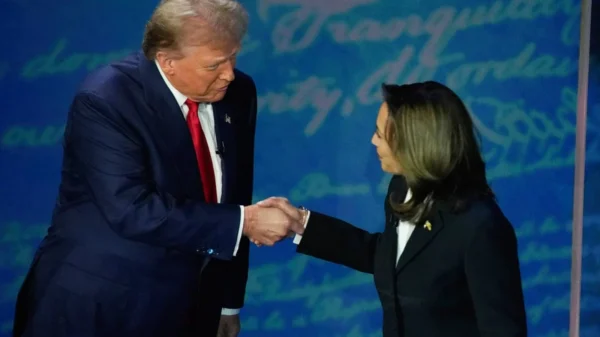Features Editor Ishaan Rahman on how extremists in the US Congress are trying to airbrush January 6th’s shocking insurrection from history
On January 6th this year, the world witnessed something previously thought impossible: a violent mob of terrorists attacking the United States Capitol building in an attempt to overthrow the government and overturn the results of a democratic election. The rioters consisted of far-right extremist groups, white nationalists and conspiracy theorists all united in their support of President Donald Trump and belief that he, not Joe Biden, won the 2020 Presidential Election.
When elections are disputed, governments overthrown and opposition leaders imprisoned in third-world countries, the conventional wisdom is to say “it could never happen in America”, the beating heart of liberal democracy. And yet, it very nearly did.
The attack was not a surprise to some. Terrorist groups and President Donald Trump himself had boasted about a “wild” event on the day that Congress ceremonially tallied electoral votes from the election in November. Not to mention, right-wing terrorists had already accounted for over 90% of violent attacks in 2020. The FBI Director Christopher Wray said America’s greatest domestic terror threat comes “those who advocate the superiority of the white race”.
So why were the Capitol police so woefully unprepared for the attack? Why were the scenes on January 6th so shocking despite the terrorists virtually planning the event in broad daylight?
This was what a proposed bipartisan commission into the insurrection would aim to answer. Thorough investigations into national disasters and traumas are common procedure. September 11th and the attack on the US Embassy in Benghazi were all followed up by intensive and widely-respected independent investigations. However, an inquiry into January’s unprecedented insurrection has been met with fiery debate and blocked at every turn simply for political gain.
Some background
In November 7th 2020, Democratic candidate Joe Biden was declared the winner of the Presidential race defeating incumbent President Donald Trump. In virtually every previous election, the loser concedes graciously and the new President-elect is invited to the White House. Most notably, President George H.W. Bush hosted Bill Clinton, who had soundly defeated him in the nasty 1992 Election. More recently, in 2016, then President-elect Trump was received at the White House by Barack Obama, who had campaigned against him for Hillary Clinton.
But 2020 was not the same. As votes were still being counted on the night of November 3rd, President Trump prematurely declared victory and claimed, without evidence, that shadowy forces were attempting to “steal” the election from him. When Biden was announced the winner, the Trump campaign was busy plotting a path to cling to power.
Trump’s lawyer Rudy Giuliani filed dozens of bogus lawsuits, Trump himself pressured public servants across the country into endless recounts and audits with mixed success. As a last resort, he infamously begged Georgia’s top election official, a Republican, to “find me 11,780 votes”, the exact amount he would have needed to top Biden’s vote total in the state.
The wannabe dictator’s campaign failed miserably. Giuliani’s cases were swiftly dismissed by liberal and conservative judges alike and ruthlessly mocked. Election officials, both Republican and Democrat, denounced Trump’s baseless claims of fraud that had led to death threats against them and refused to bend to his pressure. Election results were subsequently certified in all fifty states with little delay.
Despite the embarrassing failure of Trump’s legal campaign, over half of Republican voters believed the election was “rigged” and that Joe Biden was not the rightful winner. Dozens of Republicans in Congress had organised to oppose certifying the results of the election. Those supporters and their anger would prove pivotal in the coming weeks.
January 6th arrives
Electoral college votes are how one is elected President of the United States. Candidates need 270 out of 538 votes to win; each state is given a number of votes based on population. For decades, the media has called the winner of Presidential races based on data they receive from vote counters meaning the results are often known within a day of the election taking place (results in 2020 took four days due to Coronavirus). However, electoral votes are officially tallied by Congress two months after the election by the Vice President as per the US Constitution. This is usually a formality. In the past, lawmakers have objected to certain election results though never with the intent of invalidating or undermining the outcome.
But President Trump had another idea: he was publicly pressuring his Vice President, Mike Pence, to reject electoral votes meant for Biden. To be clear, the Constitution allows the Vice President to oversee the vote counting but does not grant them the authority to change the results. Accordingly, Pence rejected the call. However, almost 150 Republicans in the House of Representatives and a dozen in the Senate planned to object to the results.
As this was happening, Trump had assembled his supporters outside the Capitol building. He told an armed, unruly crowd “if you don’t fight like hell, you’re not going to have a country anymore” and “we will never give up, we will never concede”. Trump briefly added “peacefully and patriotically make your voice heard” but his supporters were already fired up.
Moments later, a violent mob swarmed the Capitol building, overwhelming the police and defences. They attacked police officers (ironically, with “Blue Lives Matter” flags), planted bombs, hurled racist slurs at black cops, and chanted “hang Mike Pence” and “hang Nancy Pelosi”. In the end, five people died, 138 police officers were injured and there were over $30 million in damages. Trump’s supporters remarked “our President wants us here”.
The Aftermath
The initial reaction from Congress was a de-escalation in tensions. Numerous Republicans who had initially planned to object to election results decided to withhold their reservations. Still, about 121 House Republicans and six Senators still voted to object to election results in key battleground states but they were defeated by the Democratic majority and some (more sane) Republicans. Those politicians also filed a lawsuit to the Supreme Court asking to invalidate results from states that Biden had won but the court dismissed it as nonsensical.
After a few more hours of debate, the election was officially certified. President Trump conceded the race though continues to claim that the election was rigged to this day; he also referred to the rioters as “patriots” even after the violence. Trump’s role in the insurrection and his failure to condemn the terrorists led to his swift ban on Twitter and other social media platforms.
There was bipartisan condemnation of rioters and several Republicans, including the Senate leader Mitch McConnell, placed the blame for the violence on President Trump. Articles of impeachment were speedily brought to the House floor and Trump was impeached for a second time though only ten Republicans joined House Democrats to vote for it. A few months later, the Senate voted 43-57 to acquit the former President. While seven Republicans joined the fifty Democrats in convicting, the Constitution requires 67 Senators to vote for a conviction.
On January 20th, Joe Biden was inaugurated as the 46th President of the United States. The anticipated social unrest did not materialise.
The “Big Lie” lives on
Many Republicans continue to question the legitimacy of the 2020 election. Those who have come out against the “Big Lie”, such as Congresswoman Liz Cheney, have been brutally stripped of their ranks and leadership positions. Others who voted to impeach Trump for his actions on January 6th, such as Senators Pat Toomey and Richard Burr, are retiring before the 2022 Midterm Elections having lost the backing of the Republican base.
The unity displayed by Congress on January 6th was short-lived. Despite initially condemning the riots and even Trump, Republicans quickly resorted to re-writing history. Senator Ron Johnson claimed there was “no violence” at the Capitol on that day, that the rioters “love their country” and it only would’ve been dangerous had the protestors been Black Lives Matter.
For the record, independent analysis found that 93% of the Black Lives Matter protests that took place last summer were peaceful while virtually all of the pro-Trump rallies featured armed, FBI-designated extremist groups.
Many other statements have been made downplaying the attack including saying that it was merely a “tourist visit”. These beliefs are widespread amongst Republican voters too. 40% believed that the Capitol rioters’ anger was justified and a majority said that somehow “left-wing protestors” were to blame for the attack. The latter claim was repeated by a member of Congress.
More disturbingly, Republican-controlled states across the country, including Georgia, Arizona, Texas and others, began taking drastic measures to restrict access to voting that disproportionately affect ethnic minority and urban voters, two groups that largely supported President Biden. At the time of writing, state governments are scaling back vote-by-mail, purging people from voter lists, imposing burdensome ID requirements (21 million registered voters lack a photo ID) and limiting the number of polling places in densely-populated cities. In Georgia, a new law would even give the Republican-controlled state legislature the ability to appoint the majority of election officials. All of these measures were justified by the apparent need to “secure” America’s elections from “fraud”. In reality, said fraud is virtually non-existent; that’s not an opinion, it’s a fact.
Truth and reconciliation
As common sense would dictate, many in Congress and amongst the American public wanted to know why the events of January 6th occurred and, crucially, who was responsible. On May 14th, the Chairman of the House Homeland Security Committee, Bennie Thompson, and his Republican colleague, John Katko, introduced the January 6th Commission Bill to the House of Representatives.
The bill proposed a 10-member, bipartisan commission to investigate the causes of the insurrection, why the Capitol police were so unprepared and how to avoid similar violence in the future. Despite the deal between Thompson and Katko, Republican leader Kevin McCarthy came out against the bill and, as expected, Trump vocally opposed the commission too. After overcoming several hurdles, the January 6th Commission bill passed the House of Representatives in a 252-175 vote with 35 Republicans joining the Democratic majority in supporting it.
Truth fails
Passing the House, where the bill only needed a simple majority, turned out to be the easy part. In the United States Senate, non-budget related bills need a supermajority, or 60 out of 100 votes, in order to avoid a filibuster and pass. Democrats currently control the Senate but only have fifty seats. Therefore, they’d needed to find ten Republicans to back the bill.
That became much harder when Republican leader Senator McConnell announced his opposition to the commission despite having criticised former President Trump before. Texas Senator John Cornyn who had previously called for an investigation into the attack also intended to vote against the bill. This opposition only hardened even as the mother of deceased police officer Brian Sicknick, who died after the events of January 6th, begged them to vote for the commission.
On May 28th, the January 6th commission failed to pass the Senate with 54 Senators voting for it and 35 against. As mentioned, because the Senate’s obscure rules, the 35-group won. Six Republicans voted with 48 Democrats. Some Senators missed the vote but, even if everyone were present, it is unlikely that the bill would’ve passed.
Republicans were surprisingly candid about their opposition to the January 6th commission. Many had openly said that they voted against the bill because they did not want the focus to be on Trump’s incitement of violence going into the 2022 Midterm Elections, where they hope to retake control of Congress.
Democrats and the Republicans who supported the bill were livid. Even moderate Democrat Joe Manchin, usually conciliatory and bipartisan, called Republicans “unconscionable”, an understatement for a party that is supporting terrorists over American democracy.
The F-word
Manchin is pivotal because he’s one of the few Democrats who opposes abolishing the aforementioned filibuster, which is what the Republicans are using to block bills such as the January 6th commission. Because of the Democrats’ razor-thin Senate majority they would need to get all fifty members of their caucus on board to abolish the filibuster. As it stands, both Manchin and Arizona Senator Krysten Sinema are opposed to any changes to the filibuster.
In the past, both parties have resisted abolishing the filibuster in the past as it carries serious risks. Democrats will have to constantly live in fear that when the Republicans eventually take back Congress that they will have completely unfettered power. That fear is what’s prevented both Democrats and Republicans from changing the rule when they’ve been in the majority before.
While Manchin was furious with his Republican colleagues for opposing the commission, he has still said that he will not change his position on the filibuster seemingly dooming any other non-budget legislation Democrats want to pass. President Biden openly expressed his frustration at Manchin and Sinema at a recent rally without mentioning their names.
Where to now
Democrats are exploring other ways to investigate the events of January 6th though any other alternatives will lack the authority that an independent investigation has. Senate Majority leader Chuck Schumer has said he could bring the bill back for another vote in the Senate but that it’s not clear whether it’s gained any support since the first vote.
The vote on the commission also has implications for the broader Democratic agenda too. On gun control, healthcare, voting rights and police reform, Democrats will struggle to get bills passed if the filibuster is still in place. Federal voting rights protections are particularly pertinent in light of the aforementioned restrictions being passed across America. Schumer is hoping that Manchin will change his tone as Republicans continue to block vital legislation, Manchin’s visible frustration at the commission vote may be a sign that the plan is working.
More importantly, the failure of the commission exposes a dangerous fissure in American politics. It is not between different ideologies but those who believe in truth, patriotism and democracy and those who stand for terrorism, treason and lies. Civility, bipartisanship and constructive governance depends on two parties that both live in reality despite having different perspectives. The Republicans who voted against the January 6th commission ignored the grieving mother of a police officer who protected them in favour of conspiracy theories and their own political fortunes. They didn’t deserve that protection on January 6th. The least we can do is make sure they never get their hands on power again.
Editor-in-Chief
















